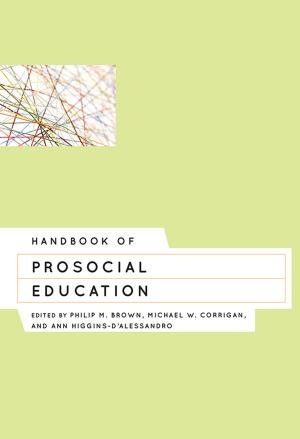Biomental Child Development
Perspectives on Psychology and Parenting
Nonfiction, Health & Well Being, Psychology, Developmental Psychology, Child & Adolescent, Child Development| Author: | Frank John Ninivaggi M.D. | ISBN: | 9781442219069 |
| Publisher: | Rowman & Littlefield Publishers | Publication: | October 27, 2012 |
| Imprint: | Rowman & Littlefield Publishers | Language: | English |
| Author: | Frank John Ninivaggi M.D. |
| ISBN: | 9781442219069 |
| Publisher: | Rowman & Littlefield Publishers |
| Publication: | October 27, 2012 |
| Imprint: | Rowman & Littlefield Publishers |
| Language: | English |
Biomental Child Development: Perspectives on Psychology and Parenting coins the novel term “biomental” to denote the interaction of the actual and gradually integrating body and mind from conception through development over infancy, childhood, and adolescence. This innovative approach presents a vision that recasts descriptions and explanations of child development to capture the inter-connectedness of the physical and the emotional experience.
This book provides the reader with a basic understanding of normal or typical child, adolescent, and adult psychology that is life-positive and energetic. Concrete details—charted chronologically and thematically—of development are outlined stressing both their overlapping biological and psychological significance. In addition to a clear and succinct overview of child development in one user-friendly volume, concrete parenting strategies and numerous examples are given throughout. Time tested theories, modern problems (for example, “bullying” and toxic electronic media use), and pragmatic parenting techniques are integrated, using current findings from psychology, psychiatry, and neuroscience. Parents, grandparents, and other caregivers will learn techniques to help parents achieve a working understanding of child development and effective skills for each stage. The biomental perspective emphasizes that positive parenting encompasses a diversification of styles that characterize differences among both children and caregivers.
Biomental Child Development highlights children’s emotional development and the all too often neglected role of fathers. Bold attention is given to considerations of gender, especially fathers as males, as well as the emotions of envy, greed, jealousy, and competitiveness as they influence development and parenting. How these apparently negative emotions may be recognized and used constructively to enhance development is discussed in detail. This new understanding and approach to child development and parenting is a welcome addition to the resources on parenting currently available.
Biomental Child Development: Perspectives on Psychology and Parenting coins the novel term “biomental” to denote the interaction of the actual and gradually integrating body and mind from conception through development over infancy, childhood, and adolescence. This innovative approach presents a vision that recasts descriptions and explanations of child development to capture the inter-connectedness of the physical and the emotional experience.
This book provides the reader with a basic understanding of normal or typical child, adolescent, and adult psychology that is life-positive and energetic. Concrete details—charted chronologically and thematically—of development are outlined stressing both their overlapping biological and psychological significance. In addition to a clear and succinct overview of child development in one user-friendly volume, concrete parenting strategies and numerous examples are given throughout. Time tested theories, modern problems (for example, “bullying” and toxic electronic media use), and pragmatic parenting techniques are integrated, using current findings from psychology, psychiatry, and neuroscience. Parents, grandparents, and other caregivers will learn techniques to help parents achieve a working understanding of child development and effective skills for each stage. The biomental perspective emphasizes that positive parenting encompasses a diversification of styles that characterize differences among both children and caregivers.
Biomental Child Development highlights children’s emotional development and the all too often neglected role of fathers. Bold attention is given to considerations of gender, especially fathers as males, as well as the emotions of envy, greed, jealousy, and competitiveness as they influence development and parenting. How these apparently negative emotions may be recognized and used constructively to enhance development is discussed in detail. This new understanding and approach to child development and parenting is a welcome addition to the resources on parenting currently available.















